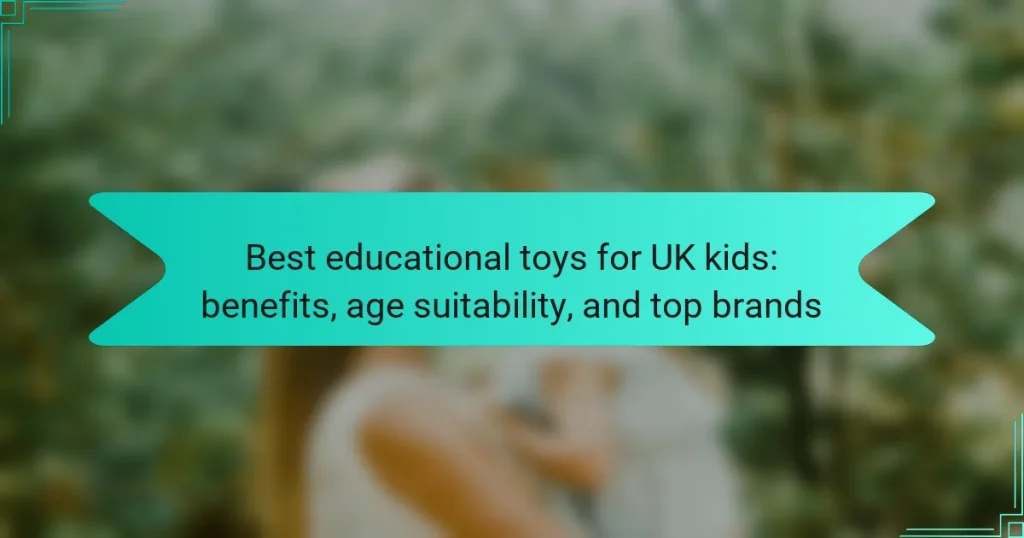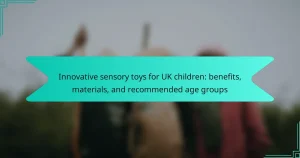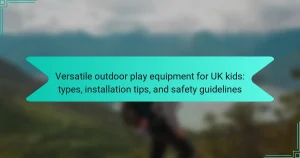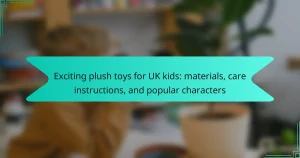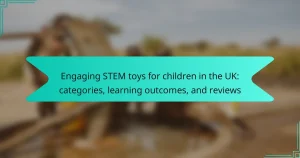The article focuses on the best educational toys for children in the UK, highlighting their benefits, age suitability, and top brands. Key toys include LEGO sets, which foster creativity and problem-solving, the Osmo Genius Starter Kit for interactive learning, and Melissa & Doug wooden puzzles that aid in fine motor skill development. Additionally, STEM kits like Snap Circuits stimulate interest in science and engineering. The content emphasizes how these toys engage children and enhance learning outcomes through hands-on play, supported by research in early childhood education.
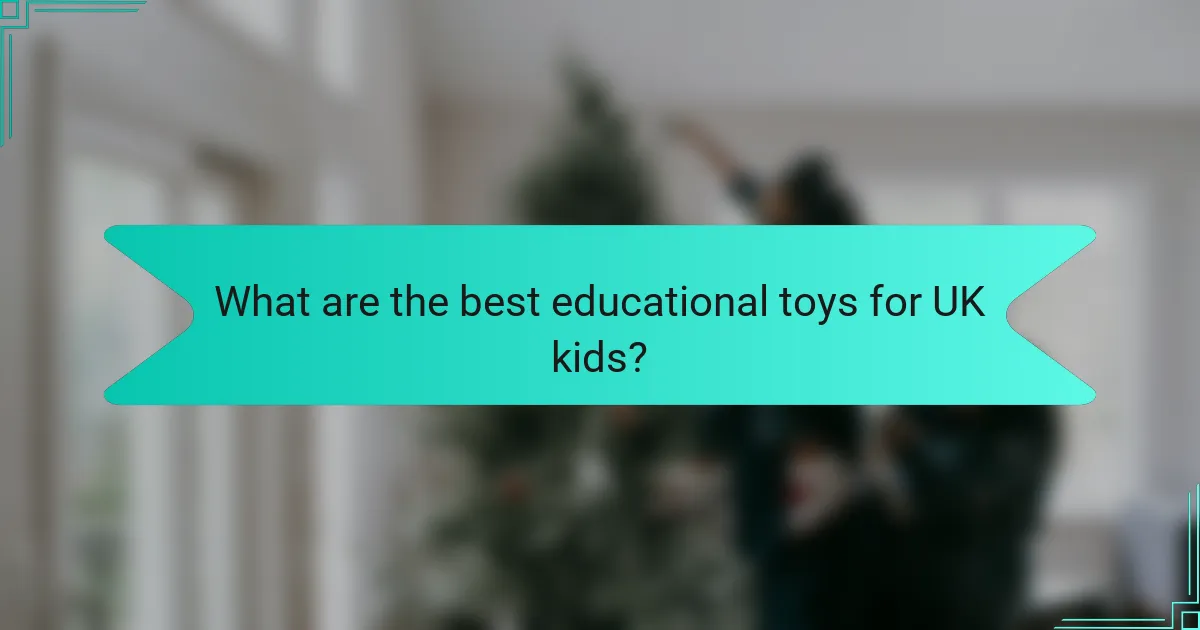
What are the best educational toys for UK kids?
The best educational toys for UK kids include LEGO sets, which promote creativity and problem-solving skills. Another popular choice is the Osmo Genius Starter Kit, enhancing interactive learning through technology. Melissa & Doug wooden puzzles are excellent for developing fine motor skills and cognitive abilities. Additionally, STEM kits, like those from Snap Circuits, encourage interest in science and engineering. These toys are designed to engage children while providing educational benefits. Research shows that hands-on play enhances learning outcomes in early childhood education.
Why are educational toys important for child development?
Educational toys are important for child development because they promote learning through play. These toys enhance cognitive skills, such as problem-solving and critical thinking. They also support social skills by encouraging interaction with peers. Fine and gross motor skills improve as children manipulate these toys. Educational toys often incorporate elements of STEM, fostering interest in science, technology, engineering, and math. Research shows that children who engage with educational toys exhibit greater creativity and imagination. According to a study published in the Journal of Educational Psychology, children exposed to educational play materials perform better academically. Thus, educational toys play a crucial role in holistic child development.
What skills can educational toys help develop in children?
Educational toys can help develop various skills in children. They enhance cognitive abilities through problem-solving and critical thinking activities. Fine motor skills improve as children manipulate small pieces or use tools. Social skills are fostered during cooperative play with peers. Language development occurs through interactive storytelling and vocabulary-building games. Emotional intelligence is nurtured as children learn to express feelings and manage frustration. STEM skills are promoted through science, technology, engineering, and math-focused toys. Research shows that play-based learning significantly benefits overall child development.
How do educational toys enhance learning experiences?
Educational toys enhance learning experiences by promoting active engagement and critical thinking. They stimulate cognitive development through hands-on activities. These toys often incorporate problem-solving tasks that encourage children to think creatively. For example, building blocks enhance spatial awareness and fine motor skills. Research shows that children learn better when they interact with their environment. A study by the American Academy of Pediatrics highlights the importance of play in learning. Educational toys also foster social skills by encouraging collaborative play among peers. This interaction helps develop communication and teamwork abilities. Overall, educational toys provide a multifaceted approach to learning that is both enjoyable and effective.
What factors should be considered when choosing educational toys?
When choosing educational toys, several factors must be considered. First, the age suitability of the toy is crucial. Toys should match the developmental stage of the child. This ensures safety and maximizes learning potential. Second, the educational value is important. The toy should promote skills such as problem-solving, creativity, or motor skills. Third, safety standards must be verified. Toys should be made from non-toxic materials and have no small parts that could pose choking hazards. Fourth, durability is essential. High-quality toys withstand wear and tear from active play. Lastly, the interests of the child should be taken into account. Engaging toys enhance learning and keep children motivated. These factors collectively ensure that educational toys are effective and safe for children’s development.
How does age suitability impact the selection of educational toys?
Age suitability significantly impacts the selection of educational toys. Toys designed for specific age groups cater to developmental milestones. For instance, infants benefit from toys that stimulate sensory exploration. Toddlers require toys that enhance motor skills and problem-solving abilities. Preschoolers need educational toys that promote social interaction and early literacy. Age-appropriate toys ensure safety and engagement, preventing frustration or disinterest. Research indicates that children learn best when toys match their cognitive and physical abilities. The right educational toys foster skill development and encourage a love for learning.
What safety standards should educational toys meet?
Educational toys should meet several safety standards to ensure child safety. These include compliance with the EN71 standard in Europe, which specifies safety requirements for toys. Toys must be free from harmful substances such as phthalates and heavy metals. They should also have no small parts that pose a choking hazard for children under three years old. Additionally, toys must be tested for durability and mechanical safety. Labels must provide clear age recommendations and safety warnings. These standards help protect children and ensure toys are safe for educational use.
What are the top brands of educational toys in the UK?
The top brands of educational toys in the UK include LEGO, Fisher-Price, VTech, Melissa & Doug, and Orchard Toys. LEGO is known for its building sets that promote creativity and problem-solving skills. Fisher-Price offers toys that enhance early learning through play. VTech specializes in electronic learning toys that engage children with interactive features. Melissa & Doug focuses on wooden toys that encourage imaginative play and fine motor skills. Orchard Toys creates games that combine fun with educational content, supporting various learning objectives. These brands are recognized for their quality and effectiveness in educational play.
Which brands are recognized for quality and educational value?
LEGO, Melissa & Doug, and VTech are brands recognized for quality and educational value. LEGO promotes creativity and problem-solving through building sets. Melissa & Doug focuses on imaginative play and fine motor skills development. VTech provides interactive learning through electronic toys. These brands consistently receive high ratings from parents and educators. They are often featured in educational toy lists and reviews.
What unique features do these brands offer?
Different brands of educational toys for UK kids offer unique features that enhance learning experiences. For instance, LEGO Education provides hands-on building kits that promote creativity and problem-solving. Melissa & Doug focus on wooden toys that encourage imaginative play and fine motor skills. VTech specializes in electronic learning toys that integrate technology with educational content. Hape offers eco-friendly toys made from sustainable materials, promoting environmental awareness. Each brand incorporates specific educational methodologies to support child development. These features cater to various learning styles and age groups, ensuring a broad appeal among parents and educators.
How do educational toys benefit children of different ages?
Educational toys benefit children of different ages by promoting cognitive, social, and physical development. For infants, toys that encourage sensory exploration enhance brain development. Toddlers benefit from toys that foster problem-solving skills and creativity. Preschoolers gain language and social skills through interactive play. School-age children develop critical thinking and collaborative abilities with more complex educational toys. Research indicates that children who engage with educational toys show improved academic performance and social interactions. For instance, a study by the American Academy of Pediatrics found that play with educational toys significantly boosts early literacy skills.
What types of educational toys are suitable for toddlers?
Types of educational toys suitable for toddlers include building blocks, shape sorters, and interactive books. Building blocks enhance fine motor skills and spatial awareness. Shape sorters promote problem-solving and hand-eye coordination. Interactive books stimulate language development and cognitive skills through storytelling. Other suitable toys are musical instruments, which encourage auditory skills and rhythm recognition. Puzzles also support critical thinking and matching skills. These toys are designed to engage toddlers while fostering essential developmental milestones.
What educational toys are best for preschoolers?
Building blocks are among the best educational toys for preschoolers. They promote creativity and enhance fine motor skills. Additionally, puzzles are excellent for developing problem-solving abilities. Art supplies, like crayons and paper, encourage self-expression and cognitive development. Educational games that focus on numbers or letters help with early literacy and numeracy skills. Furthermore, interactive toys that engage children in play-based learning foster social skills and teamwork. Research shows that play is critical for preschoolers’ development, making these toys essential for their growth.
Which educational toys are recommended for school-aged children?
Recommended educational toys for school-aged children include building sets, science kits, and art supplies. Building sets, like LEGO, enhance creativity and spatial skills. Science kits offer hands-on experiments, fostering an interest in STEM subjects. Art supplies encourage self-expression and fine motor skills. Board games promote critical thinking and social interaction. Puzzles improve problem-solving abilities and cognitive skills. Educational technology, such as tablets with learning apps, supports personalized learning experiences. These toys are widely recognized for their developmental benefits and are popular among parents and educators.
How can parents choose the right educational toys for their children?
Parents can choose the right educational toys for their children by considering developmental appropriateness. Toys should match the child’s age and developmental stage. For example, infants benefit from sensory toys, while toddlers may need building blocks. Parents should also look for toys that promote critical thinking and creativity. Interactive toys that encourage problem-solving skills are ideal. Additionally, safety is crucial; toys must be non-toxic and free from small parts. Research shows that children learn best through play, making educational toys essential for growth. Choosing toys that align with educational goals can enhance learning experiences.
What tips can help parents identify high-quality educational toys?
To identify high-quality educational toys, parents should consider several key factors. First, look for toys that promote active learning through engagement and interaction. Toys that encourage problem-solving and creativity are often more beneficial. Check for age-appropriateness; toys should match the developmental stage of the child. Safety is crucial; ensure toys are made from non-toxic materials and have no small parts for younger children. Additionally, seek toys that have received educational endorsements or awards. Reviews and ratings from other parents can provide insight into the toy’s effectiveness. Lastly, consider the brand reputation; established brands often prioritize quality and educational value.
How can parents encourage their children to engage with educational toys?
Parents can encourage their children to engage with educational toys by creating a stimulating environment. They should demonstrate how to use the toys effectively. This hands-on approach helps children understand the educational value. Parents can also set aside dedicated playtime for these toys. Consistent interaction reinforces interest and learning. Additionally, they can join in the play to make it more enjoyable. Research shows that parental involvement significantly enhances a child’s learning experience. Engaging with educational toys together can foster curiosity and creativity.
The main entity of the article is educational toys for UK kids, which play a vital role in child development by enhancing cognitive, social, and physical skills. The article explores the best educational toys available, such as LEGO sets, the Osmo Genius Starter Kit, and Melissa & Doug puzzles, highlighting their benefits and age suitability. It also discusses essential factors for selecting educational toys, safety standards, and top brands recognized for quality and educational value. Additionally, the article provides insights into how educational toys can foster creativity, problem-solving, and critical thinking across different age groups.
